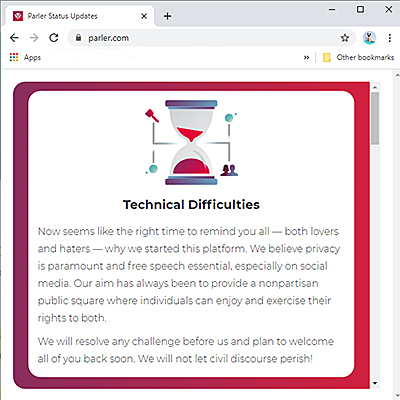Parler Is Still Dead
Of all the multiplying modes of online censorship displayed over the past four years, and especially over the past few months, two stand out: The deplatforming of a U.S. President by Twitter and Facebook, and the deplatforming of an entire platform, Parler, by Amazon Web Services.
Parler’s case illustrates the vacuous absurdity of the glib libertarian refrain “the free market will ensure free speech.” Content producers on YouTube are routinely deplatformed after finally becoming, after years of hard work, barely able to make a living. It is absurd to think these micro-players will just automatically rebuild their audiences and remonetize their work on some alternative platform. Even if they could rebuild their audience overnight, where can they go? YouTube controls 90 percent of the U.S. market. Ninety percent. Small producers aren’t going to build their own platform. And the alternative platforms they might migrate onto, all of them combined, only offer one-tenth as many viewers.
Yet Parler’s case is even harder. This company potentially has access to millions in additional financing, if not tens of millions, which they can invest in building a new platform that doesn’t depend on the global online hosting resources of Amazon. But with over ten million users and the potential to rapidly grow by at least one order of magnitude, only the biggest hosting services can accommodate Parler. That’s a small list, headed by Amazon, followed by Google Cloud, Alibaba, IBM, and Cloudflare. And barring a breakthrough that we would have heard about by now, none of them will do business with Parler.
Parler’s website has been reduced to a splash page, offering hopeful updates. The company’s initial expectation was they would be back up in a few weeks. That didn’t happen. Then, only a few days ago, co-owner Dan Bongino told Fox News that Parler would be back up by February 8. They’re not.
A Big Tech media mouthpiece, Fast Company, recently published an article that describes the technical challenges facing Parler. Quoting from the article:
“If Parler didn’t want to risk being dropped by another web host, it could alternatively set up its own in-house servers. That’s what the far-right social network Gab did after getting dropped by its hosting provider, Joyent, in 2018. After relying on a different host for the following two years, Gab announced last September that it had built its own infrastructure instead. But going that route is even more burdensome than relying on a smaller host. Again, Parler would have to work out all of the areas where its code expects to hook into Amazon Web Services in particular, and it would have to rebuild many of the tools that Amazon had provided as part of its service. On top of all that, Parler would have to pay for the actual servers, wait for them to arrive, and employ enough engineers to actually configure them.”
If technical challenges weren’t enough, there have also been management shakeups, with Parler’s CEO and co-founder John Matze terminated on January 30 by the company’s board of directors.
If Parler reappears anytime soon, it will be against all odds. Don’t hold your breath.
* * *



